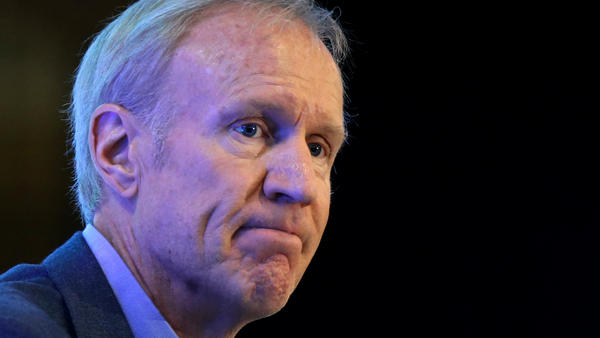Gov. Rauner criticized former Gov. Quinn for only releasing a portion of his tax returns that showed the sources of his income and he turns around and does the same exact thing. Well, the State of Illinois is in the hands of a “business” man and we all know what the goals of a business are…work more and spend less. With the state still not having a budget, seems like only 1 family in Springfield is doing well and he isn’t taking a salary!!
Read more as reported by the Chicago Tribune:
Gov. Bruce Rauner shattered state records for personal campaign spending in 2014 yet still earned $20 million more than he spent on politics, his tax returns show.
Rauner, a longtime equity investor with a broad portfolio, reported adjusted gross income of $57.5 million for 2014. State election records show he spent $37.3 million in personal funds in 2014 on politics, most of it to win the Republican primary for governor and topple Democratic incumbent Pat Quinn in the general election.
The tax documents disclosed by Rauner on Friday give only a broad brush glimpse into his finances. In keeping with a practice since declaring his candidacy in 2013, Rauner released only the two-page Form 1040 that he and his wife, Diana, filed jointly in recent days with the Internal Revenue Service after seeking an extension past the April 15 filing deadline.
Not disclosed were the schedules and other attachments that would flesh out details of where his money is parked and the size and sort of tax breaks he can leverage.
State law does not require Rauner to make any tax disclosures, but many top officials and politicians routinely make more fulsome revelations about their taxes, including the release of supporting attachments.
Even so, a bare-bones version of such information can be gleaned from the 1040s. It shows, as it has in prior years for Rauner, that the bulk of his income comes from revenue categories that qualify for tax rates discounted well below the 39.6 percent top federal tax bracket for high earners. As such, the $15.2 million in federal taxes paid by Rauner were equivalent to just 26 percent of his income.
More than 60 percent of Rauner’s income — $35.4 million — was listed as coming from capital gains, a preferential tax category on which he would owe a 20 percent rate. At the same time, Rauner reported more than $7.6 million in losses in a different business related income category where the top 39.6 percent tax rate would apply if had reported making money.
He also reported paying $151 in the tax imposed on the self-employed as a substitute for Medicare and Social Security taxes. For most wage earners, those taxes are deducted routinely from their paychecks.
Rauner also released the cover sheets for his Illinois tax return. They showed he paid $2.8 million in state taxes in 2014, the last year for which the flat state income tax rate stood at 5 percent.
Rauner has now released five years of tax return cover sheets since announcing his candidacy for governor in late 2013. And, despite the lack of detail contained in those disclosures, they show that his annual income has grown substantially since he left regular employment as chairman of the giant Chicago-based GTCR private equity firm in fall 2012. He reported just under $55 million in adjusted gross income in 2010 and 2011 combined, but almost matched that the following year alone. In 2013, his adjusted gross income climbed to $60.1 million, dipping only slightly in 2014.
Though Rauner no longer works at GTCR, he told the Tribune in a 2014 interview that his finances were still deeply intertwined with his old company. He said at the time that his income was greatly dependent on capital gains and fees for managing multibillion-dollar GTCR investment funds.
“I’ve been a very large owner in every GTCR fund over 32 years,” Rauner said. “I also have other personal investments, some of which generate ordinary income of various types, some of which generate capital gains, some of which generate interest income.”
As in other years, Rauner’s 2014 returns reflected no regular business income that could be subject to high tax rates. He has acknowledged to the Tribune that fees charged by GTCR to manage investment funds are routinely waived and converted into a stake in the firm’s own investments. That bookkeeping maneuver is used to allow top GTCR managers to count what they receive from such income as lower taxed capital gains rather than higher taxed income.
Source: Chicago Tribune

















































































































































































































































![[Video] Chicago Police Officers Caught On Video Telling Two Black Men "We Kill Mother F**kers"](https://earhustle411.com/wp-content/uploads/2018/07/evil-cop-3-300x180.jpg)
![[Video] Chicago Police Officers Caught On Video Telling Two Black Men "We Kill Mother F**kers"](https://earhustle411.com/wp-content/uploads/2018/07/evil-cop-3-80x80.jpg)












![[Video] White Woman Calls The Cops On Black Real Estate Investor, Cops Threaten To Arrest Her For Harassing Him](https://earhustle411.com/wp-content/uploads/2018/05/nosy-neighbor-300x180.png)
![[Video] White Woman Calls The Cops On Black Real Estate Investor, Cops Threaten To Arrest Her For Harassing Him](https://earhustle411.com/wp-content/uploads/2018/05/nosy-neighbor-80x80.png)


![White Scientist Says The Black Community Is Being Targeted By The Medical System, They Are Deliberatly Being Poisoned [Video]](https://earhustle411.com/wp-content/uploads/2016/05/mike-adams-300x180.jpg)
![White Scientist Says The Black Community Is Being Targeted By The Medical System, They Are Deliberatly Being Poisoned [Video]](https://earhustle411.com/wp-content/uploads/2016/05/mike-adams-80x80.jpg)








![Teenage Girl Shot In Her Stomach Three Times But Took Time To Post To Facebook [ Video]](https://earhustle411.com/wp-content/uploads/2016/02/Gangster-chick-300x180.jpg)
![Teenage Girl Shot In Her Stomach Three Times But Took Time To Post To Facebook [ Video]](https://earhustle411.com/wp-content/uploads/2016/02/Gangster-chick-80x80.jpg)







